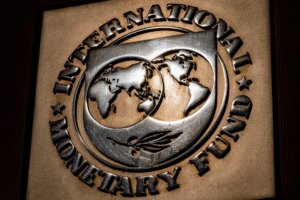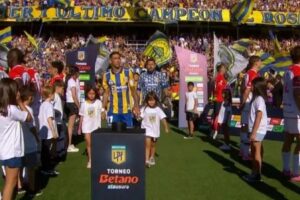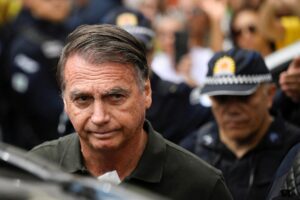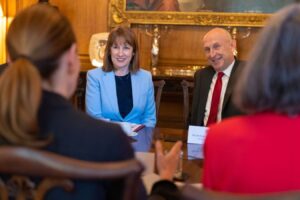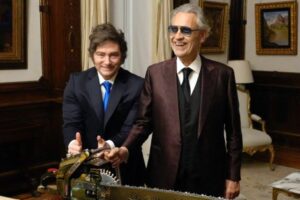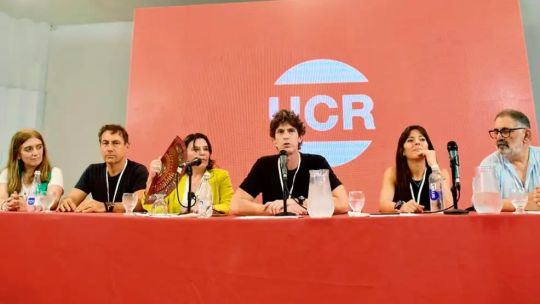
Friday, December 12, will not just be any old day for the Unión Cívica Radical, one of Argentina’s historic political parties. On that day the UCR National Committee authorities, chaired by Martín Lousteau, stand to be renewed but that succession – along with the general political context – obliges a rethink of the future of a party passing through one of its most complex moments.
In that framework, the UCR’s five governors – along with the senators, deputies and the most influential leaders – are working toward a consensus as to who will replace Lousteau, the outgoing senator and deputy-elect for Buenos Aires City.
All that within an intricate structural context. Two of the five provincial governors are allies of La Libertad Avanza (Mendoza’s Alfredo Cornejo and Chaco’s Leandro Zdero) who want to guide the party into a close alliance with the Casa Rosada.
Zdero is already considered an employee of Karina Milei by many party colleagues, while Cornejo seeks to show his presumed strength, but has already created a problem for himself in the figure of Luis Petri. The outgoing Defence minister and deputy-elect topped 50 percent in the October midterms and will be going out to bat for LLA in two years’ time, despite Cornejo’s wishes to impose another candidate for his succession. This reality obliges him to stay within the party.
On the other hand, both Lousteau himself and the other three governors – Maximiliano Pullaro of Santa Fe, Carlos Sadir and Gustavo Valdés of Corrientes, who will be succeeded by his brother next month – in Provincias Unidas prefer a Radicalism independent from the libertarians, thinking of themselves as an option for power in 2027.
A few days ago Pullaro was discussing this issue with the influential Emiliano Yacobitti and Senator Maximiliano Abad (UCR-Buenos Aires Province). There was one central focus – before travelling to India, Corrientes Province Governor Gustavo Valdés had disavowed any intention of replacing Lousteau, the economist who created Resolution 125/2008 for grain export duties. Within the UCR they believe that the devious governor is playing for a “Draft Valdés” drive to become the next party chairman by consensus. Abad rapidly ruled himself out, alleging that he will have his work cut out helping Buenos Aires Province Radicals recover from this year’s negative electoral experience.
There are other players at the table: Cornejo himself wants to spread his wings but is vetoed by the majority. The Mendoza governor even dreams of imposing deputy Pamela Verasay (an aide of his) as chief of the future UCR caucus. None of these moves please the other actors. Zdero directly does not even give battle, given his weakness within the party from the start.
Lousteau, who wants out (quite apart from the ferocious internal criticisms received), is working for some good alternatives. The Corrientes governor has again let it be voiced that it could be him, starting to confuse his party colleagues.
The idea circulating within the UCR is to reach December 12 in the best possible shape. Just in case, Abad has put forward the idea of extending Lousteau’s term until March, if that is what it takes to reach an agreement. Yacobitti liked the idea of Pullaro taking control of the party but the Santa Fe governor has a full-time job.
That is why Valdés generates the greatest consensus today. One central fact backs this – he was the only provincial governor who won the October midterms even if only just, being on the point of losing to the libertarian Virginia Gallardo.
The atmosphere is sagaciously summarised by a veteran UCR leader when consulted by Perfil: “The biggest problem we have is that in the Radical provinces everybody does what they like. It happened with Gerardo [Morales of Jujuy] when we were in Juntos por el Cambio and every local election was a problem. Secondly, the inheritance left by Guga [Lousteau] is horrible. And thirdly, between the “bewigged” [pro-Milei] Radicals and Cornejo and the voracious libertarian moves to cannibalise our leaders, we face an enormous challenge.”
All this is combined with meagre electoral results. Lousteau could barely scrape a seat with six percent in his district, the Federal Capital. Around 170 municipal councillors running as Somos or Provincias Unidas were lost nationwide. Infighting between many of the leaders with territory makes the future even more complex.
The panorama thus consists of clearcut objectives. Bringing the National Committee back to normal is the first. Ahead of that, voices of the centenary party tell Perfil, they place value on a strategic 10-member caucus in the Senate while trying to do the same in the lower house, unifying their 12 deputies, if possible, if there are no more divisions.
“It would be stupid if we’re not at least 10 to 12 deputies with this context in the Senate and five governors,” voices a parliamentary voice, that of caucus deputy chair Karina Banfi.
Where could they flee? To the future caucus of Provincias Unidas or one of their own (as occurred when Facundo Manes, in agreement with Lousteau, divided the UCR at odds with Córdoba’s Rodrigo De Loredo due to his proximity to LLA).
In any case, the parliamentary caucuses will be in place before the December 12 summit. It will be a first sign.
related news

